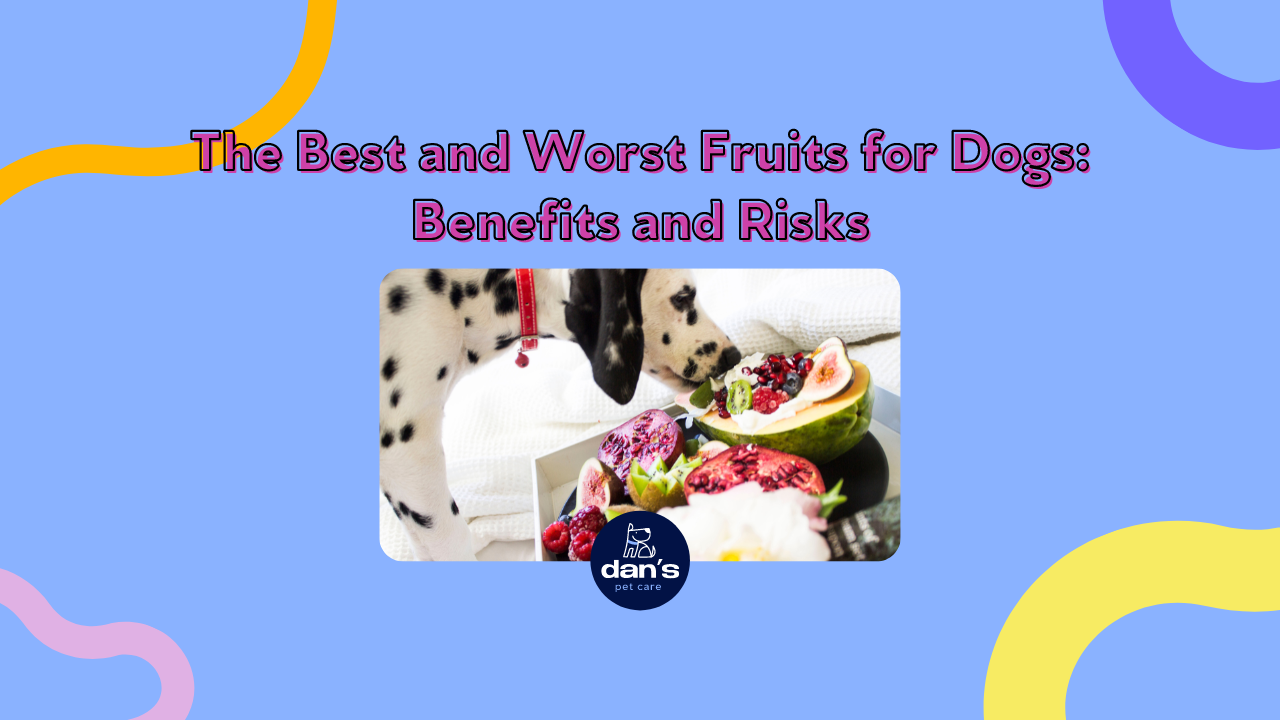As a pet owner, you may wonder which fruits are safe for your dog to eat. While many fruits can offer health benefits, some can be harmful and even toxic to your furry friend. This comprehensive guide will help you understand the benefits and risks of the best and worst fruits for dogs.
The 10 Best Fruits Dogs Can Eat
Fruits can be a delicious and nutritious addition to your dog's diet. Many fruits are packed with essential vitamins, minerals, and antioxidants that can boost your dog's health and well-being. However, it’s important to know which fruits are safe and beneficial for your dog and how to serve them properly. Here are some of the best fruits that you can safely share with your canine companion.
Can My Dog Eat Blueberries?
Yes, dogs can eat blueberries.
Blueberries are a superfood for dogs. They are packed with antioxidants, vitamins C and K, and fiber. These nutrients help boost the immune system, support brain health, and promote overall well-being. Blueberries can be given fresh or frozen as a healthy and delicious treat.
Can My Dog Eat Apples?
Yes, but with precautions.
Apples are high in vitamins A and C and dietary fiber. They are great for dental health and can help freshen your dog's breath. However, always remove the seeds and core before feeding apples to your dog, as they contain cyanogenic glycosides, which can be toxic.
Can My Dog Eat Bananas?
Yes, dogs can eat bananas.
Bananas are an excellent source of potassium, vitamins B6 and C, and fiber. They help with digestion and provide a quick energy boost. However, due to their high sugar content, bananas should be given in moderation to avoid weight gain and other health issues.
Can My Dog Eat Watermelon?
Yes, dogs can eat watermelon.
Watermelon is hydrating, low in calories, and high in vitamins A, B6, and C. It is an excellent treat for keeping your dog hydrated during hot weather. Ensure that you remove all seeds and the rind before feeding watermelon to your dog to prevent any digestive issues.
Can My Dog Eat Strawberries?
Yes, dogs can eat strawberries.
Strawberries are rich in fiber and vitamin C. They help improve the immune system and promote healthy skin. Strawberries also contain an enzyme that can help whiten your dog's teeth. However, they should be given in moderation due to their sugar content.
Can My Dog Eat Pineapple?
Yes, dogs can eat pineapple.
Pineapple is packed with vitamins, minerals, and fiber. It contains bromelain, an enzyme that aids digestion. Before feeding pineapple to your dog, remove the core and skin. Pineapple is a great treat that can help with digestion and hydration.
Can My Dog Eat Cantaloupe?
Yes, dogs can eat cantaloupe.
Cantaloupe is low in calories, high in water content, and rich in vitamins A and C. It is an excellent treat for hydration and digestive health. Ensure you remove the seeds and rind before giving cantaloupe to your dog.
Can My Dog Eat Pears?
Yes, dogs can eat pears.
Pears are high in fiber, vitamins C and K, and low in calories. They can be a great treat for dogs when fed in moderation. Make sure to remove the seeds and core, as they can be harmful to dogs.
Can My Dog Eat Mango?
Yes, but with precautions.
Mangoes are high in vitamins A, B6, C, and E, as well as fiber. They are great for the immune system and digestion. Before feeding mango to your dog, remove the pit and skin, as they can be choking hazards and contain small amounts of cyanide.
Can My Dog Eat Oranges?
Yes, but in moderation.
Oranges are high in vitamin C and fiber. They can boost the immune system and provide hydration. Due to their sugar content, oranges should be given in small amounts. Remove the seeds and peel before feeding to your dog.
The 10 Worst Fruits Dogs Should Avoid
While some fruits are beneficial for dogs, others can pose serious health risks. It's important for pet owners to be aware of which fruits can be dangerous to their furry friends. Certain fruits contain toxic substances, seeds, or pits that can cause severe health issues ranging from gastrointestinal distress to more serious conditions like kidney failure or cyanide poisoning. Here are some fruits you should avoid feeding your dog to ensure their safety and well-being:
Can My Dog Eat Grapes and Raisins?
No, dogs should not eat grapes or raisins.
Grapes and raisins are highly toxic to dogs and can cause kidney failure. Even small amounts can be dangerous. Symptoms of grape or raisin poisoning include vomiting, diarrhea, lethargy, and loss of appetite.
Can My Dog Eat Cherries?
No, dogs should not eat cherries.
Cherries contain cyanogenic glycosides, which are toxic to dogs. The pits, stems, and leaves contain cyanide, which can cause difficulty breathing, red gums, and even death if consumed in large quantities.
Can My Dog Eat Avocados?
No, dogs should not eat avocados.
Avocados contain persin, which can cause vomiting and diarrhea in dogs. The pit is also a choking hazard and can cause intestinal blockage.
Can My Dog Eat Tomatoes?
No, dogs should avoid green parts and unripe tomatoes.
Tomatoes contain solanine, which is toxic to dogs. While ripe tomatoes are generally safe in small amounts, the green parts and unripe tomatoes can cause gastrointestinal distress and lethargy.
Can My Dog Eat Lemons and Limes?
No, dogs should not eat lemons or limes.
Lemons and limes are high in citric acid, which can cause stomach upset, vomiting, and diarrhea in dogs.
Can My Dog Eat Figs?
No, dogs should avoid figs.
Figs can cause severe stomach upset and allergic reactions in some dogs. Symptoms include vomiting, diarrhea, and skin irritation.
Can My Dog Eat Plums?
No, dogs should not eat plums.
Plums contain cyanogenic glycosides in the seeds and pits, which are toxic to dogs. Ingesting plums can cause cyanide poisoning, leading to vomiting, drooling, and difficulty breathing.
Can My Dog Eat Persimmons?
No, dogs should avoid persimmons.
Persimmon seeds can cause intestinal blockage, and the fruit itself can cause stomach upset. Symptoms include vomiting and diarrhea.
Can My Dog Eat Currants?
No, dogs should not eat currants.
Similar to grapes and raisins, currants can cause kidney failure in dogs. Symptoms of currant poisoning include vomiting, diarrhea, and lethargy.
Can My Dog Eat Starfruit?
No, dogs should avoid starfruit.
Starfruit contains oxalates, which can affect the kidneys and be toxic to dogs, especially those with pre-existing kidney conditions. Symptoms include vomiting, drooling, and difficulty breathing.
Understanding the benefits and risks of fruit for dogs
Feeding your dog fruits can be a healthy and enjoyable treat, but it's crucial to know which fruits are safe and which are dangerous. While many fruits provide essential vitamins and nutrients, others can pose serious health risks. Always introduce new foods gradually and in moderation, and consult with your veterinarian if you are unsure about a specific fruit. By making informed choices, you can keep your dog happy, healthy, and safe.





